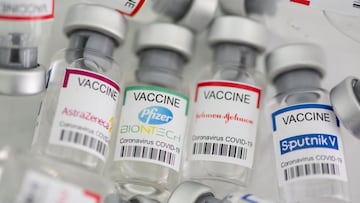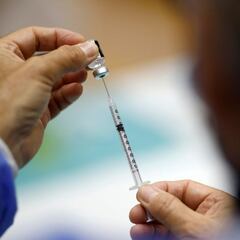Covid-19 vaccine patent waiver: how will it affect vaccine production?
India and South Africa are calling for developed nations to share the vaccine patent, but the World Trade Organization (WTO) is yet to make a decision.


On Wednesday the Biden administration confirmed that it would support the move to waive patents on covid-19 vaccinations in an effort to get the life-saving pharmaceuticals to developing nations.
A White House statement announced their intention to support a proposal made by India and South Africa last October, which has been promoted by 100 developing countries. In the statement, President Biden’s Trade Representative Katherine Tai said "extraordinary times call for extraordinary measures".
If the proposal is adopted the World Trade Organization (WTO) would allow pharmaceutical companies around the world to develop their own versions of covid-19 vaccines without fear of legal action.
Read more:
- US supports waiving coronavirus vaccine patents
- Moderna and Johnson & Johnson are still in clinical trials for children
- Will the nation's children be vaccinated before school begins in the fall?
- FDA expected to authorize Pfizer covid-19 vaccine for 12 to 15 age group
What happens next for the covid-19 vaccine waiver?
The United States’ announcement is perhaps the most notable voice in support of the proposal to date. But while the US is willing to ease the legal restrictions, Australia, Canada, the United Kingdom and the European Union have all opposed the initiative.
For now the US’ support makes no material difference and it is not until the WTO decides to adopt the patent waiver that any change will be seen. However the global trade body just acts on the wishes of its participant members, and if many major nations continue to oppose the waiver it is unlikely that it will be made law.
These extraordinary times and circumstances of call for extraordinary measures.
— Ambassador Katherine Tai (@AmbassadorTai) May 5, 2021
The US supports the waiver of IP protections on COVID-19 vaccines to help end the pandemic and we’ll actively participate in @WTO negotiations to make that happen. pic.twitter.com/96ERlboZS8
The main hope is that, now that the US is on board, the remaining opposition nations will be persuaded to compromise. There are reportedly around 100 of the WTO’s 164 states in favour, and the matter will be discussed by a panel on intellectual property next month.
We do not yet know what a potential compromise could look like, but it is possible that moving forward there could be reduced restrictions on the manufacturing and distribution of coronavirus vaccinations to aid emerging nations.
How will a patent waiver affect the vaccine effort?
The patent waiver will prevent other pharmaceutical manufacturers in other parts of the world from being taken to court for using a previously registered patent, but more will be needed to make a substantive difference to the global vaccination effort.
There have been growing calls for developed nations to share the knowledge and expertise that makes both vaccine development and rollout more efficient. Gregg Gonsalves, an epidemiologist at Yale University said that the waiver alone will not be enough.
As we are campaigning for the waiving of the patent over #covid19 vaccine, this video on insulin says it all. Dollars bills against the life of a father, mother, child. https://t.co/sf0dDXpxYt
— Agnes Callamard (@AgnesCallamard) May 6, 2021
Related stories
“This is a start,” he told the New York Times. “We need the writing of the text of this waiver now to be transparent and public, but as we have always said we need tech transfer now.”
The 'tech transfer' refers to the dissemination of vital resources like information and personnel which would be vital to recreate the conditions that the US is benefitting from with their vaccine effort. However this would require a good deal more cooperation from the world's leading powers than a relatively simple patent waiver.

